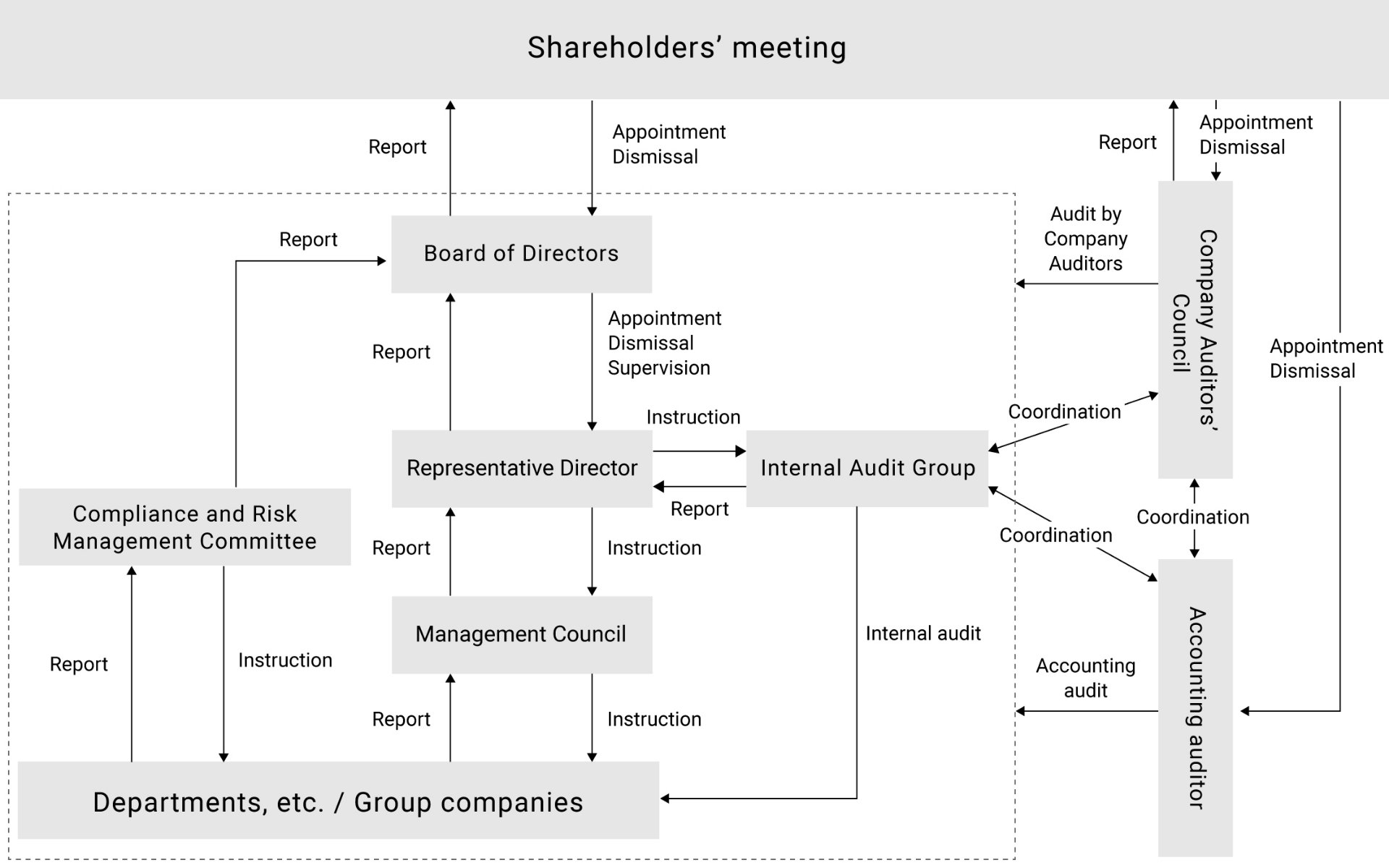Corporate governance
-
- Fundamental stance on corporate governance
-
The Progress Technologies Group (“PTG”) recognizes the importance of improving its corporate governance as it strives to meet the expectations of all its shareholders, clients, and other stakeholders and enhance its enterprise value, in line with its vision of contributing to solving social issues by continuously creating innovations with those who love technology. Accordingly, PTG has been striving to ceaselessly improve its corporate governance by implementing comprehensive compliance and risk management measures, establishing its Company Auditors’ Council, and ensuring the transparency of the company’s management decision-making and operational supervision processes.
-
- Outline of PTG’s corporate governance structure and its rationale
-
PTG has adopted the internal structure described below in order to enable effective management decision-making, the supervision and auditing of operations executed based on management decisions, the management of risks that affect the entire Group, the enforcement of legal and regulatory compliance, and the enhancement of internal control, while also being able to make decisions swiftly.
-
- Board of Directors
-
PTG’s Board of Directors consists of five members. In principle, they hold a regular meeting once a month and an extraordinary meeting whenever considered necessary, which are attended by all Directors and Company Auditors, to deliberate and decide on important management matters, while the status of the Directors’ business execution is constantly monitored and supervised, all in compliance with the applicable laws and regulations, the Articles of Incorporation, and the Board of Directors’ Regulations, etc.
-
- Company Auditors’ Council
-
PTG currently has three Company Auditors, one of which is a full-time position while the other two are part-time. In principle, the Company Auditors’ Council meeting is regularly held once a month and also ad hoc when needed, which is attended by all Company Auditors to decide on their audit policy, audit plans, etc. pursuant to the applicable laws and regulations, the Articles of Incorporation, the Company Auditors’ Council Regulations, etc. In addition, the Company Auditors conduct internal audits and audits in coordination with the company's accounting auditor pursuant to the policy and plans that have been decided by the Company Auditors’ Council.
-
- Accounting auditor
-
PTG has executed an audit contract with Sincere Audit & Co., an accounting auditor, which has been conducting audits of the company in a timely and appropriate manner. There is no particular conflict-of-interest relationship between the accounting auditor, any of its executive members involved in auditing the company, and PTG.
-
- Management Council
-
PTG has established a Management Council, which meets to discuss direction and policy on any important matters relating to its management strategy, including those submitted for deliberation by the Board of Directors. The Management Council consists of all of the company’s Directors, including the Representative Director, Executive Officers, and Company Auditors. In principle, the Management Council regularly meets once a month as well as ad hoc when needed, to deliberate on important matters including those relating to the specific implementation of operational matters decided at the shareholders’ meeting and by the Board of Directors.
-
- Compliance and Risk Management Committee
-
PTG has established a Compliance and Risk Management Committee to ensure comprehensive risk management and compliance throughout the entire Group, which holds its regular meeting every financial quarter and also periodically shares relevant information with the Board of Directors.
-
- Corporate governance structure and relationships involved
-
PTG’s corporate governance structure is as illustrated below.

